The collective aspirational global goal agreed by governments six months ago to reduce CO2 emissions in international aviation by 2030 through the use of sustainable aviation fuels and lower carbon fuels is impossible to achieve or at best highly ambitious, said Willie Walsh, Director General of IATA at the association’s AGM in Dubai, hosted by Emirates. He also rejected a claim by a UAE government representative that IATA, along with other industry stakeholders, had pushed for the target at ICAO’s third Conference on Aviation and Alternative Fuels (CAAF/3) held last November, also in Dubai. Achieving the target required governments to deliver concrete measures to facilitate the exponential ramp-up of SAF they were calling for, said Walsh. He said that in the past, the industry had been rightly criticised for setting environmental targets that it could not and did not achieve. Meanwhile, IATA expects the sector’s net profits to reach $30.5 billion in 2024, up from $27.4 billion last year.
Under a ‘Global Framework’ agreed by ICAO member states at CAAF/3, to support the achievement of the long-term aspirational goal (LTAG) for international aviation of net zero carbon emissions by 2050, “…ICAO and its member states strive to achieve a collective global aspirational Vision to reduce CO2 emissions in international aviation by 5 per cent by 2030 through the use of SAF, LCAF [lower carbon aviation fuels] and other aviation cleaner energies (compared to zero cleaner energy use).”
In a Net Zero panel session on SAF production held during the AGM and World Air Transport Summit 2024, the UAE’s State Lead Negotiator for Aviation Climate Change and also Vice Chair of ICAO’s CAEP environment committee, Maryam Al Balooshi, said industry stakeholders, including IATA, had pushed for the target. However, Walsh said this was incorrect.
“The reason we didn’t push for 5% is that we don’t believe that globally it can be achieved. The aspirational target was set by governments, it was not set by IATA,” he said. “Based on everything we see, we don’t believe it’s possible, unless governments start moving fast to support the production of SAF.
“It’s not what the industry is targeting. It’s incredibly ambitious but having put the target in place, governments have a responsibility to assist in achieving the target they set.”
At a subsequent press conference, he added: “It’s good that they have this ambitious target but they set it, so they have to be part of the solution.
“Obviously, we will do everything we can to deliver as much as possible but one of the criticisms that have been levelled at our industry in the past is that we set environmental targets that we couldn’t and didn’t achieve. I think that criticism is fair.
“When we agreed to set the net zero target, we sat down to satisfy ourselves that we had a credible pathway to achieving it. We are clear that we’re not going to set artificial targets because we recognise that if we failed to meet them, we would be open to criticism. That’s why it was important for me to stress that IATA did not push for a 5% by 2030 target.”
Walsh also criticised the big energy companies for not investing enough of their large profits into renewable fuels for aviation. “We don’t have a level playing field and we need to see them invest significant sums of money in the development of SAF. Only about 6% of renewable fuels are going to aviation so we know there is a lot out there and we want to see more of that going to aviation. Why it doesn’t is because there are incentives for the production of other renewable fuels that aren’t available for aviation. My view is that the incentive/carrot approach is the best way of assisting our industry get to net zero.”
In his opening address to the AGM, Walsh laid out a set of “global solutions” he said were needed on the journey to net zero emissions:
- Measures must be science-based and policies not based on assumptions, for example Europe’s intention to force airlines to report their non-CO2 impacts.
- More taxes are not the solution and a patchwork of market-based measures must be avoided.
- Unilateral measures must not be extra-territorial.
- With airlines soon having to account for their CORSIA credits, measures should anticipate what is needed to achieve them. Only a small fraction of the 65-162 million credits needed are available.
- SAF mandates face a similar issue where airlines must purchase SAF in amounts that do not exist and fuel suppliers accept penalties for their failure to supply the SAF requirement and pass those costs onto airlines. “This must be stopped.”
- Measures and policies must have provisions for review and abandonment if they are not producing the intended results.
- When a measure produces the right outcome, others should copy it, for example the incentive mechanisms for SAF in the US.
- Measures should direct capital towards solutions like SAF.
- Measures should envision a sunset in which the aim is to set in motion functioning markets for decarbonisation solutions that once achieved should survive as normal businesses.
Walsh concluded that while it was a long list, considerable progress had been made, for example on CORSIA, the only global market-based measure to address climate change. “The challenge is to make it work,” he said.
“We have SAF, a proven clean alternative to jet fuel. The challenge is to ramp up efficiently with diverse feedstocks and production methods. We have a common commitment with governments to decarbonise by 2050. The challenge is for governments to deliver enabling policies. And lastly, we have many possible pathways to net zero. The challenge is to promote them all and move forward.”
Other panel sessions held during event included ‘What’s the future for carbon removals’ and ‘How to sustainably grow the benefits of aviation, travel and tourism together’.
Next year’s AGM will be held in Delhi, hosted by IndiGo.
Photo: IATA


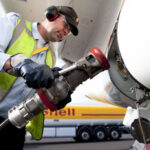


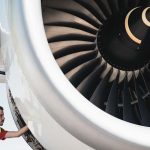

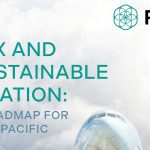
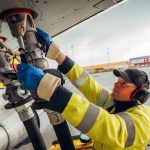
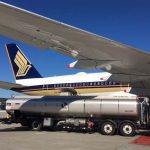


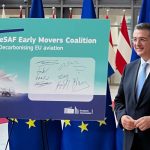



More News & Features
Lessons learned from the collapse of Fulcrum BioEnergy
Early data shows uncertainty that UK SAF mandate can be met in its first year
Swiss advanced SAF technology startups Metafuels and Synhelion reach project milestones
PtX fuels have significant Asia-Pacific potential but face many barriers, finds report
Airfreight giants DHL Express and FedEx announce big US SAF deals
Asia-Pacific study reveals pessimistic outlook for SAF uptake by 2030 as Singapore details levy